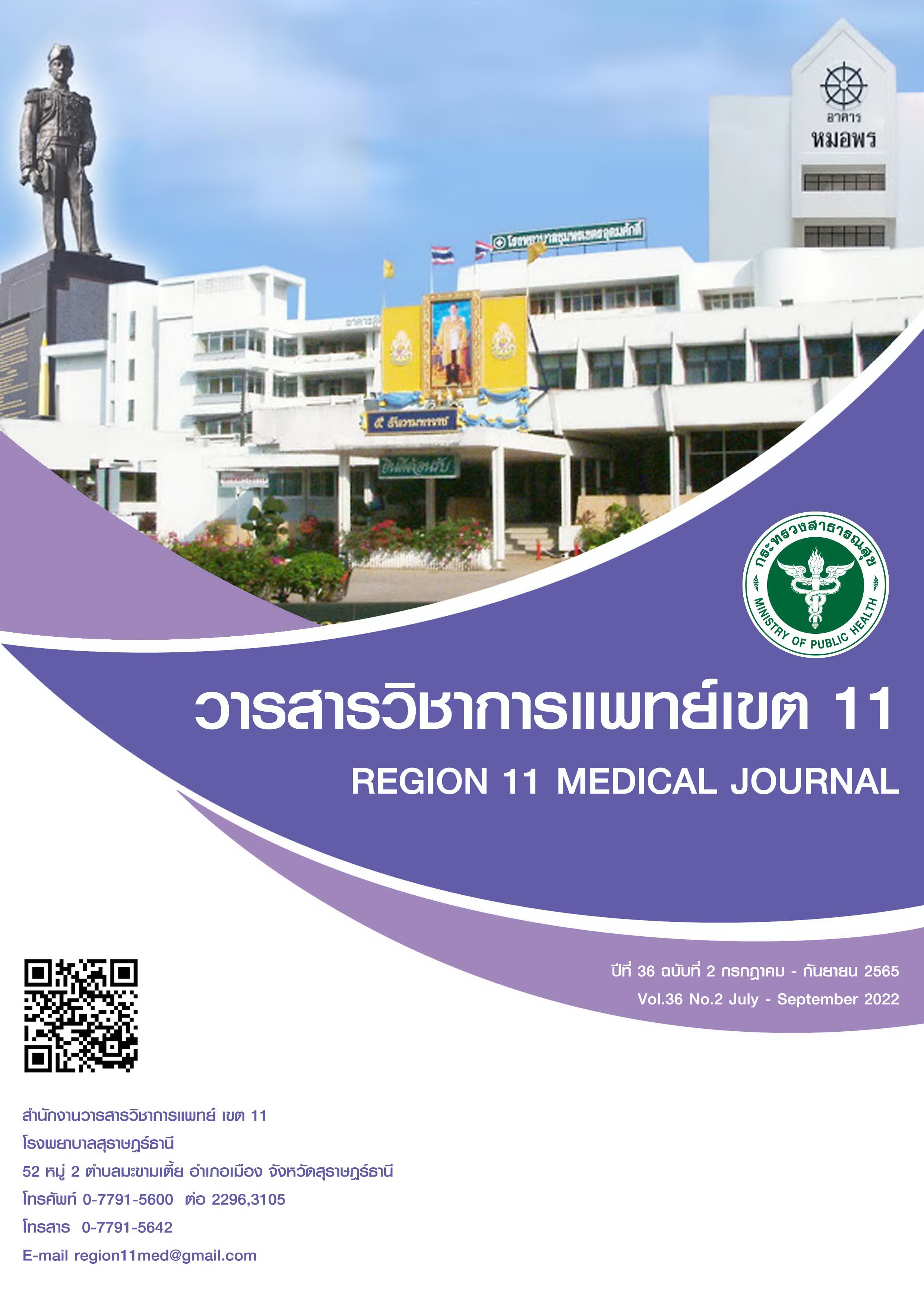An external validation of Thais’ cardiovascular 10-year risk assessment in the southern Thailand
DOI:
https://doi.org/10.14456/reg11med.2022.16Keywords:
An external validation, Cardiovascular diseases, Cardiovascular events, CV risk model, Thai CV risk scoreAbstract
Background: Cardiovascular diseases (CVDs) are the number one cause of death globally. WHO estimated that CVD was a cause of 17.9 million deaths (or 31% of all global deaths) in 2019. It may seem surprising, but we can easily prevent CVDs by altering our lifestyles to avoid associated risk factors. The only requirement needed is to know one's risk apriori. Various versions of cardiovascular risk scores are adopted to assess cardiovascular risk and associated risk factors in many countries. Thailand developed as the Thai CV risk score as a reliable tool to forecast the risk of having a cardiovascular event in the future for Thais.
Objective: This study is an external validation of the Thai CV risk score. We aim to answer two key questions. Firstly, Can the Thai CV Risk score developed using the dataset of people from the central and northwestern regions of Thailand applies to people from other parts of the country? Secondly, Can the Thai CV Risk score, developed for general people, work for hospital patients who tend to have a higher risk?
Method: This work is a retrospective study set out to answer two questions using a dataset of 1,025 patients from Lansaka Hospital in southern Thailand. We calculated 10-years cardiovascular risk using the following factors – sex, age, smoke, diabetes, systolic blood pressure, LDL, and HDL -- of all patients in 2008 and compare the predictive result to observe their actual cardiovascular events from 2008 to 2017.
Result: We are able to find answers to both questions in this study. We find that the Thai CV risk score works for the southern Thais population, including patients in the hospital. It generally works well for the low CV risk group.
Conclusion: Even though the Thai CV risk score is applicable for hospital settings, it tends to overestimate moderate and high risks. Fortunately, this poses no serious concern for general people as it only makes people more careful about their lifestyle. The doctor should be careful when using the score with other factors to make a treatment decision.
References
Tzoulaki I, Elliott P, Kontis V, Ezzati M. Worldwide exposures to cardiovascular risk factors and associated health effects: current knowledge and data gaps. Circulation. 2016;133(23):2314-33.
Mahmood SS, Levy D, Vasan RS, Wang TJ. The Framingham Heart Study and the epidemiology of cardiovascular disease: a historical perspective. The Lancet. 2014;383(9921):999-1008.
Faculty of Medicine Ramathibodi Hospital, Mahidol University[online]. 2019 Feb 12 [cited 2022 Mar 10]; Available from: URL: https://med.mahidol.ac.th/cardio_vascular_risk/thai_cv_risk_score
Vathesatogkit P, Woodward M, Tanomsup S, Ratanachaiwong W, Vanavanan S, Yamwong S, et al. Cohort profile: The electricity generating authority of Thailand study. Int J Epidemiol. 2012;41(2):359-65.
Hippisley-Cox J, Coupland C, Brindle P. Development and validation of QRISK3 risk prediction algorithms to estimate future risk of cardiovascular disease: prospective cohort study. BMJ. 2017;357:j2099.
Poplin R VA, Blumer K, Liu Y, McConnell MV, Corrado GS, Peng L, Webster DR. Prediction of cardiovascular risk factors from retinal fundus photographs via deep learning. Nature Biomedical Engineering. 2018;2:158-64.
Wikipedia.org [online]. 2021 Dec 30 [cited 2022 Mar 19]; Available from: URL: https://en.wikipedia.org/wiki/Censoring_(statistics)
Hilbert, Martin. Big data for development: A review of promises and challenges. Development Policy Review 34. 2016;1: 135-174.
Albarqouni L, Doust JA, Magliano D, Barr ELM, Shaw JE, Glasziou PP. External validation and comparison of four cardiovascular risk prediction models with data from the Australian diabetes, obesity and lifestyle study. Med J Aust. 2019
Stewart J, Manmathan G, Wilkinson P. Primary prevention of cardiovascular disease: A review of contemporary guidance and literature. JRSM Cardiovasc Dis. 2017
Wessler BS, Nelson J, Park JG, McGinnes H, Gulati G, Brazil R, et al. External validations of cardiovascular clinical prediction models: A large-scale review of the literature. Circulation: Cardiovascular Quality and Outcomes. 2021.
WHO [online]. 2016 Oct 10 [cited 2022 Feb 22]; Available from: URL: http://www.euro.who.int/en/health-topics/noncommunicable-diseases/cardiovascular-diseases/data-and-statistics
Liew SM, Blacklock C, Hislop J, Glasziou P, Mant D. Cardiovascular risk scores: Qualitative study of how primary care practitioners understand and use them. Br J Gen Pract. 2013;
Lindbohm J V., Sipilä PN, Mars N, Knüppel A, Pentti J, Nyberg ST, et al. Association between change in cardiovascular risk scores and future cardiovascular disease: analyses of data from the Whitehall II longitudinal, prospective cohort study. Lancet Digit Heal. 2021
Kingkaew N, Antadech T. Cardiovascular risk factors and 10-year CV risk scores in adults aged 30-70 years old in Amnat Charoen Province, Thailand. Asia-Pacific Journal of Science and Technology. 2019;24(04):1-10.
Collins G.S, Altman D.G. An independent and external validation of QRISK2 cardiovascular disease risk score: a prospective open cohort study. BMJ. 2010;340:2442.
Barroso L.C, Muro E.C, Herrera N.D, Ochoa G.F, Hueros J.I.C, Buitrago F. Performance of the framingham and SCORE cardiovascular risk prediction functions in a non-diabetic population of a Spanish health care centre: a validation study. Scand J Prim Health Care. 2010;28(4):242-248.
Duangrithi D, Wattanasermkit R, Rungwijee S, Khunsom N. Thai CV risk score and primary prevention in impaired fasting plasma glucose or diabetes mellitus versus normoglycemia in patients with metabolic syndrome. Int J Prev Med. 2020;
Downloads
Published
How to Cite
Issue
Section
License
Copyright (c) 2022 Region11Medical Journal

This work is licensed under a Creative Commons Attribution-NonCommercial-NoDerivatives 4.0 International License.






